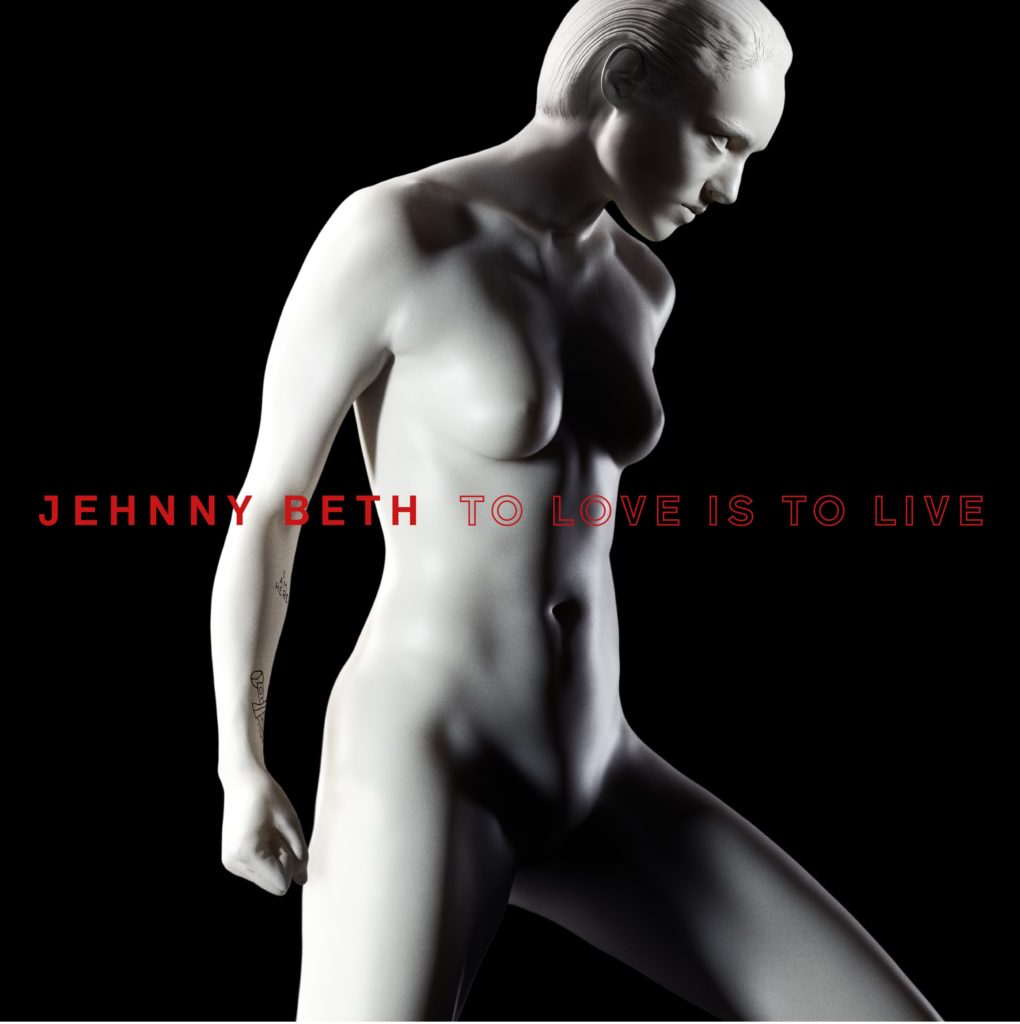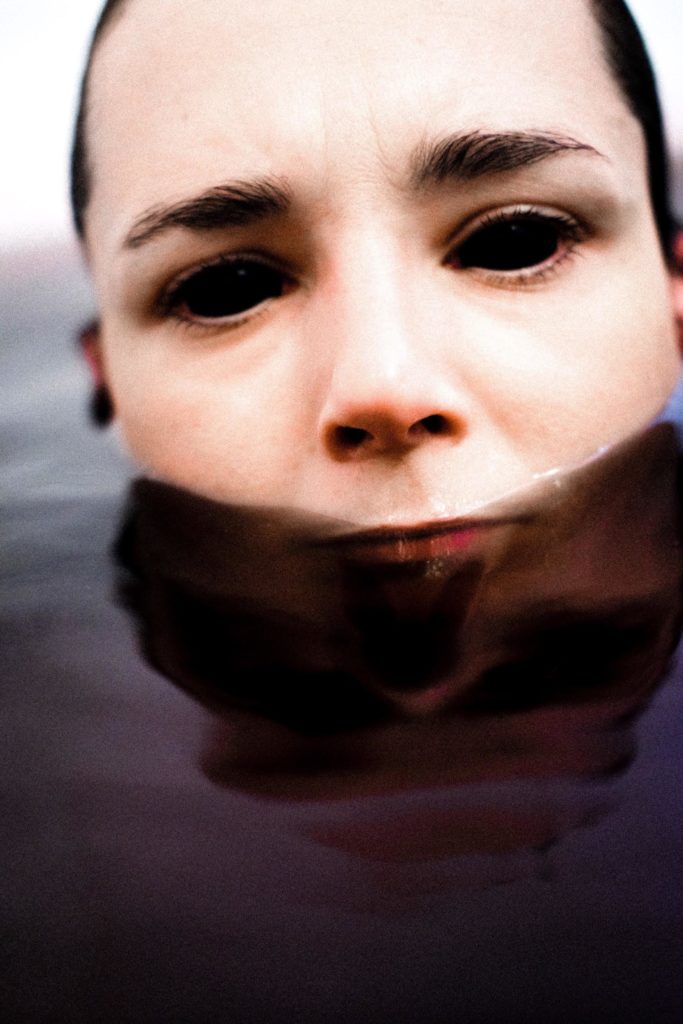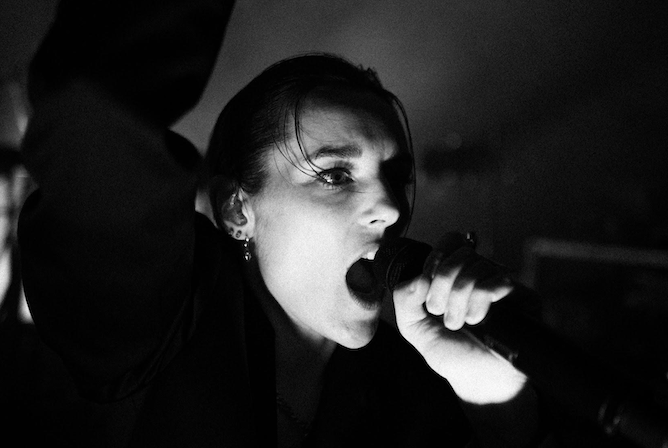Foto-Credit © Andreas Neumann
Jehnny Beth ist den meisten bestimmt als Frontfrau der derzeit pausierenden und zweifach Mercury Prize nominierten Post-Punk Band Savages ein Begriff…oder aber durch ihre vielen anderen Projekte (Beats 1 Sendung, ihre Musiksendung bei ARTE oder ihr Feature mit den Gorillaz). Kurzum: die Frau ist ein Kreativ- wie Energiebündel, vielbeschäftigt und hat trotz all dieser Baustellen auch noch Zeit und Muse gefunden, um mit TO LOVE IS TO LIVE erst kürzlich ein Solo-Debüt zu veröffentlichen. Dieses entstand mit Unterstützung der Produzenten Flood, Atticus Ross und dem langjährigen Kollaborateur Johnny Hostile in Los Angeles, London und Paris und beinhaltet Gastauftritte von Romy Madley Croft von The xx, dem Schauspieler Cillian Murphy (Peaky Blinders) sowie Joe Talbot von den IDLES. Die Arbeiten an der klanglichen Tour de Force, die man auch als düstere, filmische Meditation über die Seltsamkeit des Lebens verstehen kann, begannen übrigens in der Nacht als David Bowie starb – genug Material also für eine ganze Wagenladung an Fragen. Unser Interview mit Jehnny Beth!
First of all: how are you and how did you experience the outbreak of this worldwide crises?
The first thing I said when I stepped out of stage on March the 8th after my first show in London as Jehnny Beth at the Roundhouse was “I am ready”. After two years working on the record and six months working on the live show, hundred of thousands dollars invested in the album and the tour (including supporting Nine Inch Nails in America and Canada), I was facing all the risks with confident and felt at the dawn of a new renaissance. That weekend my management opened the calendar for 2020 and said “you’re going to be busy this year it’s not even funny!” Then a week later I was in lock down at home in Paris. You can imagine the cold shower. My first reaction was sadness, I was grieving the life that could have been, but quickly after that came resistance: resistance to the multitude of request for ‘home gigs’, resistance to the constant flow of information that suffocate creativity, resistance to my own laziness and depression by starting writing a page a day with only positive facts. I carried on boxing even more too. We need the mental strength of athletes right now!
Which was the first band / musician that really struck an impression on you, why and what did you think about them at the time?
I remember hearing Nina Simone when I was a child and wondering who that was, incapable of deciding if she was a man or a woman. I remember looking for the cover jacket where she was covered in gold and I still couldn’t determine her gender. When Nina sings she carries the whole humanity with her, she is the mother and the child, she is the lover and the sinner, she is the thief and the honest man.

How would you describe your music and which influences do you have?
For TO LOVE IS TO LIVE, there were a few records that really inspired me. I had never been a fan of Beyoncé’s music but when the album ‘Beyoncé’ came out in 2013 it really interested me. It is the only album of Beyoncé I have ever listened to intensively. It involved underground producers like Boots, and there’s a real freedom in the songwriting, it felt like a new kind of pop, the songs were fragmented which I thought was a real expression of our time. I got interested in this idea of mixing genres, having a song within a song. This album weirdly freed me from the codes of what one can do or cannot do. ‘To Pimp a Butterfly’ by Kendrick Lamar had the same effect on me, especially for its sense of narrative and its urgency. Then there was the Low album that came out ‘Double Negative’ which was so brave, it even goes as far as destroying the beautiful songs. And again there was something about that saturation that was so evocative of our times, as if beauty had to be seen from behind a veil of dirt, beautified by its inaccessibility, filtered, but still retaining elements of its beauty that you could guess through all the layers of bullshit. For me that record is as important as a painting of Rembrandt, or Egon Shield. Finally, I weirdly found myself listening to a lot posthumous albums at the time. ‘Skeleton Tree’ by Nick Cave, ‘You want it Darker’ by Leonard Cohen and of course ‘Black Star’, which had a huge waking-call effect on me.
Since your band Savages has been on a break since 2017 you have been very productive, worked with several other projects, released the soundtrack for XY Chelsea that you did produce with Johnny Hostile on your own label, hosted your Beats 1 show, plus have recently debuted a new music TV series for arte…that seems to be a lot of different battlefields for a creative mind. How do you structure your day life with all those projects and would you describe yourself as a workaholic?
My role model in that matter is Henry Rollins. I always recognised myself in the way he would diversify and never loose his identity. He would do TV, radio, be the front signer of a cult punk band Black Flag, release music as a solo artist, write books, do stand up comedy… I think that’s my vision of the artist in 2020. The album evolves inside an ecosystem with many other elements which feed each other creatively. I have found great inspiration as a radio host at Apple Music for instance. For the first time in my life I was listening to new music constantly. It made me happier and connected me with the rest of the world.
What parts of hosting radio and TV shows and with that stepping on the other side, as usually you had been the „guest“ or artists, who had been invited or interviewed, do you like especially and are there also parts that you could pass on?
When I was a kid my parents often welcomed artists at home. I witnessed many lively conversations about their work and their passion. Today that’s where I feel the most at home: in the company of other artists. Talking with them inspires me and makes me hopeful for the future. ‘ECHOES’ is a TV show created by artists for artists. It’s a place where they are free to share their experiences, and free to disagree. I wanted to create a place where musicians take the front seat and talk about the culture of today. The world needs to hear intelligent people speak on TV!

Which question would the host Jehnny Beth ask the musician Jehnny Beth about her solo debut?
I think I would ask something about the genesis of the album because I’m always fascinated by new beginnings and how someone develops the courage to break a sweat and take a risk in life. So maybe I would ask something like : “What was the impetus for TO LOVE IS TO LIVE, at which moment did you feel it was necessary to do this album?”
Was it always a plan for you to do a solo album or when did you decide to focus on working on music on your own?
It was never a conscious plan. The starting point were people close to me who kept bringing it up, including PJ Harvey and Johnny Hostile. It was only at the end of the Savages tour in 2017 that I took my decision but it was still unclear what I was going to do. I wanted to feel that feeling of stepping into the unknown, I respond pretty well when I’m committing to something before I know how to do it.

How did the way the music came into life differ from the work flow you had before with the Savages records or did you adapt the teaches of those experiences?
My intention for TO LOVE IS TO LIVE was to change the way I had been working before. I wanted to create a rupture in order to not repeat myself. I kept that focus all the way through the process. It included taking my time and accepting to work with uncertainty. In the past making a record meant going three weeks in a studio with a clear plan and the result was a photography of that moment. For this album I worked with different people, in different cities, at different times. I would forget about the record for months and concentrate on writing my book, then come back to the album. That way I was making sure the music was staying effortless, I never tried to force it.
Did you already know before writing the music how it should sound like and did you have a certain plan for the sound of the record, or was it developing in time?
It developed in time. After I had written most of the lyrics for the album I worked with Johnny Hostile in Paris on the music in our ‘lab’, we didn’t set any rules and pretty much tried everything that came to mind. We ended up with five or six versions of each track. From those sessions we got Flower and We Will Sin Together, they pretty much never changed after that. But that period of research ended up being very useful later on. We recorded a jazz trio and ended up using parts of that on The Rooms. I recorded piano and vocals alone in a studio in London and used parts of that too.
Can you describe a bit the production process of TO LOVE IS TO LIVE, how, when and where it came into life, what was the best/what the worst moment during production and what is the most told anecdote of that time?
The first person I contacted was NIN’s producer Atticus Ross. We had met before and I was a fan of his work with Trent in NIN and film soundtracks. For the first six months we spoke on emails, on the phone and eventually in LA when me and Johnny Hostile moved there for a few months to work. Atticus would visit us at night after his day with Trent. We spoke a lot so when he eventually started working on the music, he knew very well what was in my head. The first song he worked on was I Am, the opener of the album, which gave to the album that dimension of suspense and sense of narrative. Later on I met Flood in London. Flood worked on the tracks that needed real drums like Heroine and Innocence. He arrived last in the process but gave the context for me to properly finish the album. I had been collaborating a lot and it was time to bring it home. Flood gave me the confidence and the tools to do that.
Although you have always been a very direct and powerful songwriter lyricwise, this record seems to show a lot of other shades of you personally and as a songwriter, as well as more vulnerable side of yourself – how would you describe it and how can you explain did it come the this development?
I worked with Romy Madley Croft on trying to show sides of my personality that had not been represented before. We are friends but we also enjoy working together and exchanging ideas. For this record I was willing to share my work in progress with others, I felt I had to be vulnerable in the process in order to be vulnerable on the record. There are definitely parts of this album where I felt very exposed but I figured that being uncomfortable is a really good sign that you are pushing forward.

Your single Heroine just came out some days ago – can you let us know what it is about, how it came into existence and if there is a story behind the song?
When I think of this song I think of Romy strangling my neck with her two hands in the studio. She was trying to get me out of my shell lyrically and there was so much resistance in me and she jokingly lost her patience. The song was originally called Heroism but I wasn’t happy with it because it was too generic. Flood was first to suggest to say Heroine instead of Heroism. Then I remember Johnny Hostile late at night in my hotel room saying “I don’t understand who you are singing about. Who is the Heroine? You ARE the Heroine”. The next morning I arrived early in the studio and recorded my vocals adding ‘to be’ to the chorus line: “all I want is TO BE a heroine”. Flood entered the studio at that moment and jumped in the air giving me the thumbs up through the window. I guess I’m telling this story because sometimes we look around for role models and examples to follow without realising that the answer can be hidden inside of us. I was ok to be the angry man in I’m The Man but I was afraid to be the Heroine? It took all the people around me to get me there.
With the record coming out soon, in a moment where it feels that everyone is trying to get back to normal, but most of the campaign was happening in the middle of this situation – how was the music or the campaign affected by it? Which new ways / improvisations did you have to do?
Nothing about what happened in 2020 was imaginable in advance. So as soon as I realised everything was out of my control I felt better. My team has been incredible in replanning everything pretty much on a day to day basis, but it also felt liberating to be forced into thinking long term for this record, now that the tour will be happening in 2021. In the last decades records have been produced and released on a faster and faster pace. We are focused on being relevant in a world that is constantly changing, to the point that maybe it has become detrimental to the music and the mental state of the artists.
Usually when you release a new record the plan is also to tour the album, now all venues are closed (with a lot of them struggling to still be active, when the whole situation is over, the same with a lot of festivals), as well as the borders of most countries. What are your plans for touring at the time and how do you imagine life after all of this?
I believe things will eventually get back to normal. I live in France now but I work mainly abroad, in America and the UK. It will probably take longer in those countries but people miss going to gigs and festivals and they will want to go out again once the fear has passed, I know I do. I’m already reprogramming my festival dates for 2021 including Primavera in Barcelona, Spain.

Last but not least – the obvious question: what did the other Savages members say about the record, what does the solo record mean for the future of the band and are there plans you can already tell us for an end of the band break?
I haven’t heard from the rest of the band regarding my album and there aren’t any plans for now for me to join the band again. All that matters to me right now is the here and now, and right now it’s about TO LOVE IS TO LIVE.
Thanks again for your time, stay healthy and looking forward to meet again, hopefully soon!
You too. Thank you very much for your time and for writing about the record, my best, Jehnny.









